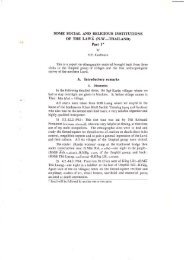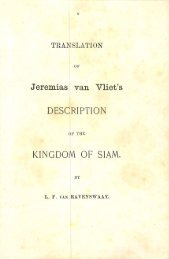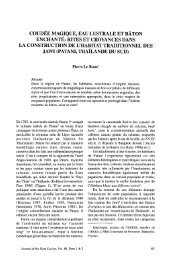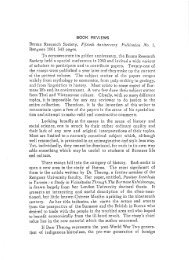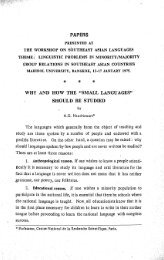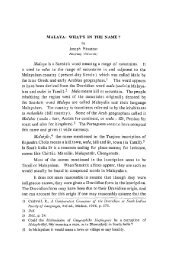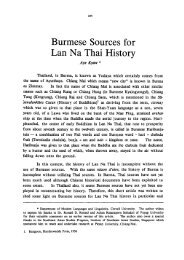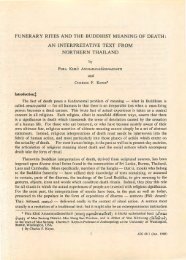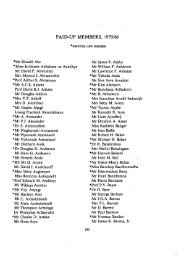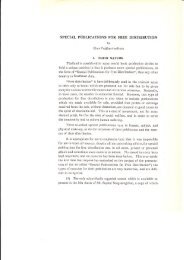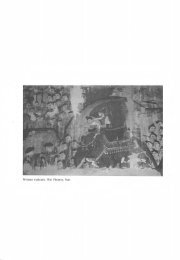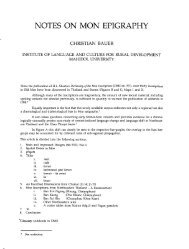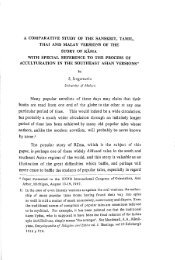REVKJEWS - Siamese Heritage Protection Program
REVKJEWS - Siamese Heritage Protection Program
REVKJEWS - Siamese Heritage Protection Program
You also want an ePaper? Increase the reach of your titles
YUMPU automatically turns print PDFs into web optimized ePapers that Google loves.
Heinz Bechert, Editor, Die Sprache der altesten buddhistischen Vberlieferung.<br />
The Language of the Earliest Buddhist Tradition (Symposien zur Buddhismusfor<br />
schung II) (Gottingen: Vandenhoeck und Ruprecht, 1980), 193 p. (Abhandlungen der<br />
Akademie der Wissenschaften in Gottingen, Philologisch-Historische Klasse. Dritte<br />
Folge 117).<br />
In contrast to the first symposium held under the auspices of the Academy<br />
of Sciences at Gottingen and organized by Heinz Bechert Bupdhism in Ceylon and<br />
Studies on Religious Syncretism in Buddhist Countries (1978), the second meeting has·<br />
concentrated on a much narrower and more precisely defined subject: the language of<br />
the earliest Buddhist tradition. Eight contributions, five in English, two in German and<br />
one in French, are framed by a general introduction to the subject and abstracts of the<br />
discussions that succeeded each paper.<br />
The "Introduction" and the "Allgemeine Bermerkungen" (General Remarks),<br />
both by Heinz Bechert, furnish an excellent guide to the present state of research<br />
reached and the methods applied in dealing with the problems of historical linguistics<br />
in early Buddhist texts. Within the twenty years since the posthumous publication of<br />
H. Liiders' {1869-1943) fundamental book Beobachtungen uber die Sprache des buddhistischen<br />
Urkanons (Observations on the language of the original Buddhist canon)<br />
(1954), the contents of which have been summed up conveniently in English by M.A.<br />
Mehendale, Some Aspects of Indo-Aryan Linguistics (1968), the idea of an original<br />
canon, from which all existing canonical Buddhist texts are derived somehow or other,<br />
has become more and more doubtful. Therefore the word "Urkanon" has been banished<br />
from the headline of this symposium, as it is dropped from the discussion on<br />
linguistic and literary problems.<br />
Thus the discussion focusses on· the means and ways of how to get a clearer<br />
picture of the lost language or languages at the time of the Buddha. One of the major<br />
difficulties, which has yet to be overcome, is the lack of an investigation similar to<br />
Li.iders' work into the earliest language used by the Jains. The articles of Ludwig<br />
Alsdorf (1904-1978), to whom this volume is dedicated, "Ardha-Magadhi" and of<br />
Colette Caillat "La Langue Primitive du Bouddhisme" (the original language ofBuddhism)<br />
deal with this aspect, while K.R. Norman "The Dialects in which the Buddha<br />
Preached" tries to reconstruct different dialects used by the Buddha on different occasions<br />
from the wording of parallel passages known from the Northern and Southern Buddhist<br />
traditions and showing a similar, but not an identical Text. At the same time he<br />
tries to revive the opinion of Hermann Oldenberg (1854-1920) that the home of Pali is<br />
162



